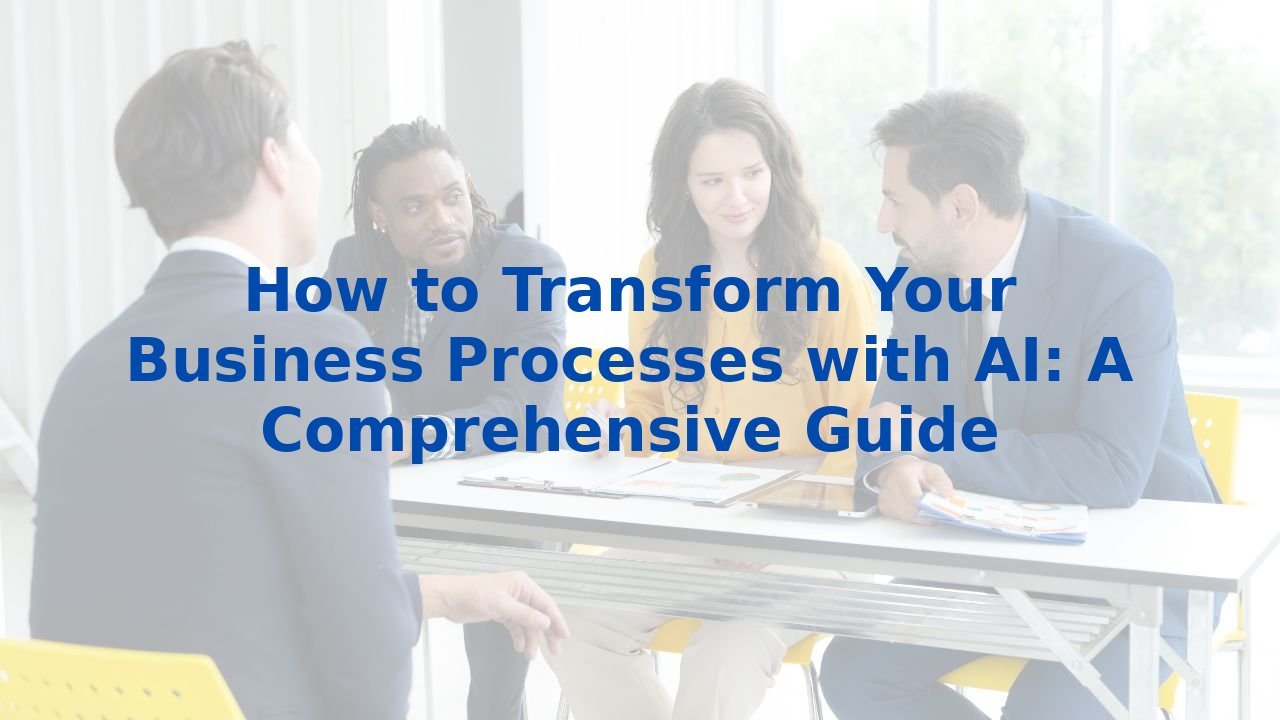How to Transform Your Business Processes with AI: A Comprehensive Guide
How to Transform Your Business Processes with AI: A Comprehensive Guide
In an era characterized by rapid innovation and accelerating change, businesses are constantly seeking ways to enhance their efficiency and remain competitive. One of the most promising avenues for achieving this is through the integration of Artificial Intelligence (AI). Embracing AI can automate repetitive tasks, enhance decision-making capabilities, and streamline operations. This guide explores how AI can transform various business processes and why investing in AI training for employees is equally vital for maximizing benefits.
Understanding AI Process Optimization
At its core, AI process optimization refers to the use of AI and machine learning technologies to improve business process management. It involves analyzing vast amounts of data, automating manual tasks, and providing actionable insights—all geared towards supporting organizational strategies and reaching goals. The primary objectives here are to minimize errors, boost productivity, and enhance operational efficiency.
Key Applications of AI in Business Processes
Process Discovery and Mapping
Using advanced techniques like process mining and natural language processing, AI can uncover existing business processes and create dynamic, up-to-date process maps. This ensures that documentation accurately reflects the real-time operational landscape, aiding in swift decision-making.
Process Automation
Imagine transforming tedious manual tasks into automated processes. AI-driven bots can take over activities such as data entry and document processing. This not only reduces the risk of human error but also saves precious time that can be redirected towards more strategic initiatives.
Predictive Analytics and Decision-Making
AI empowers better decision-making through predictive analytics. By identifying trends and forecasting outcomes, organizations can mitigate risks and seize opportunities. Automating manual tasks combined with the analysis of process performance provides insights that inform strategic choices.
Continuous Improvement
AI fosters a culture of continuous improvement by delivering ongoing feedback and data-driven recommendations. This cyclical approach ensures that your business processes evolve in tandem with industry trends and objectives, maintaining competitiveness.
Risk Management and Compliance
With the ability to predict vulnerabilities and detect anomalies, AI plays a pivotal role in risk management. By maintaining compliance with industry standards and executing processes consistently, businesses can shield themselves from potential fines and penalties.
The Profound Benefits of AI in Business Processes
Boosting Productivity
The automation of repetitive tasks allows organizations to achieve more with less. By freeing human resources from mundane activities, employees can dedicate their efforts to strategic and innovative projects that drive growth.
Cost Reduction
Streamlining processes through AI not only minimizes the demand for labor but also optimizes resource allocation. This leads to substantial cost savings and improved efficiency, giving businesses the financial agility they need to thrive.
Enhancing Customer Satisfaction
AI elevates customer experiences by providing personalized support and faster response times. Automated systems enable businesses to offer immediate assistance, which fosters stronger relationships and elevates overall satisfaction.
Improving Decision-Making
AI's analytical prowess provides accurate, timely insights derived from extensive data analysis. This means businesses can make informed decisions grounded in real-world data, unlocking new opportunities for improvement.
Emphasizing the Importance of Employee Training in AI Integration
While the benefits of AI are clear, realizing its full potential hinges on equipping employees with the right skills. Training your workforce in AI is not merely a nice-to-have; it’s a necessity. Here’s why:
Understanding AI Capabilities
Training enables employees to grasp the capabilities and constraints of AI, which leads to more effective integration into their daily responsibilities.
Ensuring Data Quality
High-quality input is critical for AI to function optimally. Well-trained employees can ensure the accuracy of the data fed into AI systems, resulting in more reliable outcomes.
Adapting to Technological Change
Fostering a culture of learning and adaptability through AI training positions your organization to seamlessly embrace new technologies in the future.
Collaboration with AI
A well-trained workforce understands how to collaborate effectively with AI systems, leveraging both human intuition and machine efficiency for superior results.
Conclusion
Artificial Intelligence stands as a transformative force capable of revolutionizing business processes. By automating routine tasks, enhancing strategic decision-making, and streamlining operations, organizations can unlock new levels of efficiency and productivity. However, to harness AI's full potential, investing in employee training is imperative. Through careful integration and continuous learning, businesses can navigate the complexities of today’s dynamic market with confidence and agility.
Embrace AI thoughtfully, and watch your organization flourish in an increasingly competitive landscape. With a commitment to innovation and a well-prepared workforce, the future is indeed bright.



